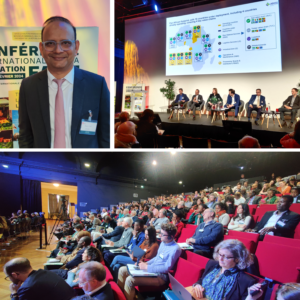On February 13, 2024, the annual conference of the FARM Foundation took place, where our president Marc Debets serves as a board member. During this event, Bhavin Vyas, Chief ESG Officer at ARISE, participated in the roundtable discussion on the role of the private sector in financing agricultural transformations. This article revisits his insights on ARISE’s model in Africa and the group’s focus on societal and environmental impacts in each of their projects.

Bhavin Vyas’s intervention, Chief ESG Officer, ARISE
Can you describe ARISE’s activities?
Arise is an agro-industrial infrastructure company. We believe in adopting a comprehensive ecosystem approach in Africa.
Our model consists firstly in building farmers’ capacities, to help them develop their production and make it more efficient. Then, we develop Special Industrial Zones (ZIS) to attract foreign direct investment. Within these ZIS, the products grown by local farmers are processed and then transported.
That’s why our model relies on road building and the development of transport infrastructures. Without this, an agro-ecological product would have no chance of leaving the country.
So, you advocate for the development of end-to-end integrated agri-food chains on the African continent?
Currently, Africa exports raw materials and imports finished products. Value is created outside the continent.
The only way to change this model is to process the products locally, thereby creating value within Africa and redistributing it locally to impact the entire continent economically.
To facilitate the implementation and success of your projects, you support the public-private partnership model.
Public-private partnerships are an excellent solution for the agricultural sector, combining the strengths of both the public and private sectors. PPPs offer the private sector’s transparency and execution speed, while the public sector creates a political and regulatory environment conducive to the project’s proper implementation. It is truly a beneficial investment model for all parties involved.
We believe public-private partnerships are crucial in the agricultural sector. ARISE’s model was built on a PPP, and then it scaled up. We are present in three countries: Togo, Benin, Gabon, with plans to expand to Chad soon. We are also growing in Rwanda, Sierra Leone, DRC, Côte d’Ivoire, Nigeria, and Congo.
What commitments has ARISE made regarding environmental sustainability?
Climate change is often discussed as a global issue, but it is also a supply chain problem. For all the raw materials we process, we conduct a life cycle analysis. We have found that producing in Africa, processing in Africa, and then exporting to Europe and America can save up to 60% in carbon emissions.
The current model of producing in Africa, processing with labor in China, and then exporting to consumers in Europe contributes to accelerating environmental and climate issues. We believe it is more beneficial to keep both the raw materials and the labor in Africa and then export directly to the end consumer.
This is the essence of the model we are implementing, which is advantageous not only for the economic development of the continent but also for the climate and the planet through the reduction of carbon emissions.
NB: These statements were taken from the roundtable discussion “The Role of the Private Sector” during the FARM Foundation conference on February 13th. Intermediate questions were intentionally added to provide context and highlight key points.
Watch the replay of the Fondation FARM’s 2024 conference
Replay: https://fondation-farm.org/replay-video-conference-farm-2024/